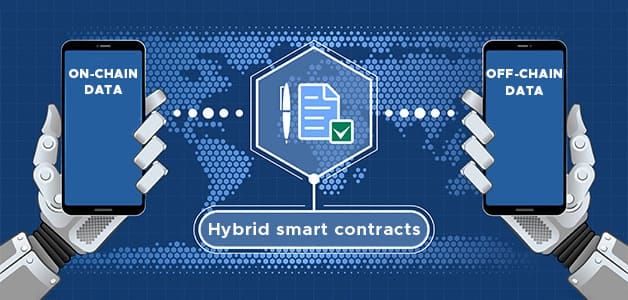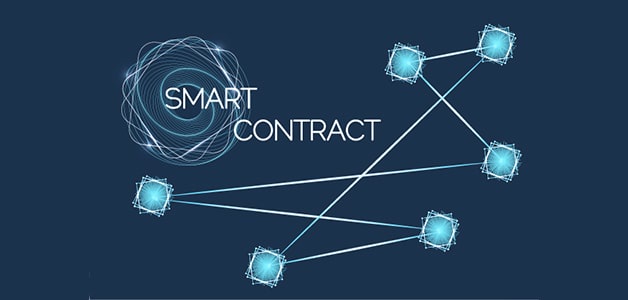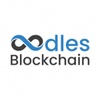Hybrid smart contracts combine on-chain data with off-chain data. This smart contract development service offering provides businesses with connectivity to real-world data sources with consensus-based data validation. You may learn more about these newer forms of smart contracts in this blog and how they solve the problems that come with more conventional smart contracts.
What are Hybrid Smart Contracts
Hybrid smart contracts utilize decentralized oracle networks (DONs) for obtaining off-chain data. A DON is a peer-to-peer network with various participants that forms a consensus on data before sharing it with smart contracts.
Thus, hybrid smart contracts can simultaneously process the off-chain data and maintain decentralization among networks. The creation of more sophisticated blockchain-based apps is made possible by this capability.

Why Hybrid Smart Contracts
In the commercial and legal ecosystem, traditional contract structures are opaque and unchangeable. Blockchain technology was developed to solve this issue.
Blockchain smart contracts address the transparency and immutability issues of traditional contract systems. With self-executing programs, smart contracts establish automation across a blockchain network. However, these auto-executing programs fail when it comes to fetching data from outside the network, i.e., off-chain data. Thereby, blockchain networks become isolated from the real world.
A technology called Oracle tackles this issue by translating off-chain data for smart contracts.
But this software is centralized, so there are chances of data manipulation.
Here, hybrid smart contracts remove reliability problems that might occur while utilizing a single centralized oracle.
Also, Check: Blockchain Interoperability: Importance, Challenges, and Solutions
The Working of Hybrid Smart Contracts
In a hybrid smart contract model, a smart contract sends a data request to DON whenever it requires off-chain data.
After receiving this data, an oracle smart contract in DON logs an event with the details of the data request.
It alerts off-chain nodes connected with the log. These oracle nodes fetch data from the log event.
Then, they use external sources, including APIs, to obtain information and place it on-chain for smart contracts usage.
Before sending the data, oracle nodes reach a consensus to validate the data.
Benefits of Hybrid Smart Contracts
All of the advantages of a blockchain, such as dependability, transparency, and credibility, are present in a hybrid smart contract. At the same time, it can extract off-chain data with the help of a DON. Some more benefits of a hybrid smart contract are the following:
- High data correctness guarantees
- Authenticity proofs (cryptographic protocols that verify individual data from outside sources)
- Consensus-based data validation
- Availability of off-chain data to smart contracts
- Good incentive compatibility
Use Cases of Hybrid Smart Contracts across Industries
Decentralized Finance
People use multiple DeFi applications for lending, borrowing, trading, creating, and saving assets.
These applications can rely on hybrid smart contracts to acquire, validate, and supply data from the real world.
In this way, people get accurate and reliable data.
This contract lets DeFi developers focus on their products rather than developing infrastructure to obtain price data for their smart contracts.
Also, Visit: Smart Contracts Development for DeFi | A Guide for Investors
Weather Forecasting
Hybrid smart contracts easily allow the transfer of weather data onto blockchains.
It enables businesses to create parametric insurance contracts that automatically give payouts during certain weather conditions. It can help farmers to rely on such insurance.
Gaming
The operation of blockchains is not random. For this reason, blockchain applications that need to generate random numbers are vulnerable to hackers. Because of this opaque randomness, games with PvP combat and prize pools suffer greatly.
A hybrid smart contract can generate tamper-proof randomness with the help of DONs.
Moreover, smart contracts can change the reward distribution model.
Gaming dApps can utilize hybrid smart contracts to fetch real-world information to process game functions that result in better performance.
Dynamic Non-fungible Tokens (NFTs)
A dynamic NFT is a non-fungible token that can change its metadata with external conditions.
Smart contract developers encode it with a hybrid smart contract, which uses DON to interact with external data. Users can use this interaction for peer-to-peer trading, minting, or burning NFTs.
Also, Read: Dynamic NFTs | Understanding the Dynamics of dNFTs
Conclusion
It is encoded by smart contract developers using a hybrid smart contract that communicates with external data via DON.
Peer-to-peer trading, minting, and NFT burning are all possible with this interaction.
If you want to enter this emerging market, then it is best to pick the right partner for your upcoming project.
Oodles Blockchain is the ideal partner for your blockchain project. Our smart contract developers have expertise in hybrid smart contract development. Contact us today to avail yourself of our services.


No comments yet